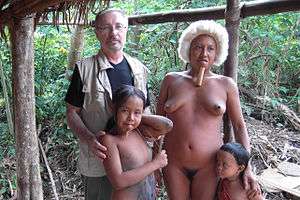Zo'é people
 | |
| Total population | |
|---|---|
| (256 (2010)[1]) | |
| Regions with significant populations | |
|
| |
| Languages | |
| Zo'é[2] | |
| Religion | |
| traditional tribal religion | |
| Related ethnic groups | |
| Wayampi |
The Zo'é people (also known as Zo'é or the Marrying tribe) are a native tribe in the State of Pará, Municipality of Óbidos, on the Cuminapanema River, Brazil.[3] They are a Tupi–Guarani[4] people.[5]
Name
They are also known as the Poturu, Poturujara, or Buré. The term "Zo'é" means "us," as opposed to non-Indians or enemies. The term "Poturu" is the type of wood used to make the embe'po labrets which they wear.[1]
Language
The Zo'é language belongs to Subgroup VIII of the Tupi-Guarani language family.[2]
Culture
All Zo'é wear the poturu, a wooden plug piercing the bottom lip. The Zo'é have a tradition where new fathers have the backs of their calves cut with the 'tooth of a small rodent'.
The marriage rituals of the Zo'é are complex and not fully understood. It is not known how many wives or husbands one is allowed to have. Many women practice polyandry, one or more husbands may be "learning husbands"; young men learning how to be good spouses, in exchange for hunting for the rest of the family.
In the state of Para, Northern Brazil, in one of the last still largely unexplored rainforests in the world, a new tribe, the Zo'é, was recently contacted. They live between the Amazon River and the country of Suriname. The Zo'é are part of the Tupi linguistic group. Little is known about them. They are semi-nomadic hunters and gatherers. Their favorite prey is monkey, which is plentiful in the region during the dry season. During the rainy season, the Zo'é rely on a root plant called manioc, which must be processed into flour to avoid its poisonous properties.— Jean-Pierre Dutilleux[6]
Notes
- 1 2 "Zo'é." Instituto Socioambiental: Povos Indígenas no Brasil. Retrieved 4 April 2012
- 1 2 "Zo’é." Ethnologue. Retrieved 4 April 2012.
- ↑ "Zo'é". ethnologue.com. Retrieved 2007-10-18.
- ↑ "The case of the Zo'é". Indigenous Peoples in Brazil. Instituto Socioambiental. Archived from the original on 2007-10-15. Retrieved 2007-10-18.
- ↑ "Jipohan is someone like yourself". socioambiental.org. Archived from the original on 2007-07-05. Retrieved 2007-10-18.
- ↑ "Jean-Pierre Dutilleux, The Zoe". jpdutilleux.com. Archived from the original on December 28, 2007. Retrieved 2007-10-18.
Further reading
- Carelli, Vincent, and Dominique T. Gallois. Meeting ancestors The Zo'e. [Brazil]: Centro de Trabalho Indigenista, 1993.
External links
| Wikimedia Commons has media related to Zo'é people. |
- Associação de Apoio Mobilizado ao Povo Zo’é e Outras Etnias (Association of mobilized support to the Zo'e people and other ethnicity)
- (Korean) 아마존의 눈물(Tears of Amazon) – MBC 2010 special documentary